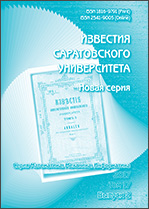|
Scientific Part
Computer Sciences
Empirical analysis of algorithms for solving the index tracking problem
A. R. Faizliev, A. A. Khomchenko, S. P. Sidorov
Saratov State University, 83, Astrakhanskaya
Str., Saratov, Russia, 410012
Abstract:
Index tracking is a passive financial strategy that tries to replicate the performance of a given index or benchmark. The aim of investor is to find the weights of assets in her/his portfolio that minimize the tracking error, i.e. difference between the performance of the index and the portfolio. The paper considers the index tracking problem with cardinality constraint, i.e. the limit on the number of assets in the portfolio with non-zero weights. Index tracking problem with cardinality constraint is NP-hard problem and it usually requires the development of heuristic algorithms such as genetic algorithms and differential evolution algorithm. In this paper we will examine different algorithms for solving the problem in $l_2$-norm, including greedy algorithm, differential evolution algorithm and LASSO-type algorithm. In our empirical analysis we use publicly available data relating to three major market indices (the Hang Seng (Hong Kong), S&P 100 (USA) and the Nikkei 225 (Japan). To compare the three approaches (the greedy and the LASSO-type algorithms, the greedy and the differential evolution algorithms) to the index tracking problem, we use both a moving time window procedure and stochastic dominance principle. Moreover, we carried out the comparison using both for in-sample and out-of-sample tracking error analysis.
Key words:
index tracking, portfolio optimization, greedy algorithm, LASSO-type regression, differential evolution algorithm.
Citation:
A. R. Faizliev, A. A. Khomchenko, S. P. Sidorov, “Empirical analysis of algorithms for solving the index tracking problem”, Izv. Saratov Univ. Math. Mech. Inform., 18:1 (2018), 101–124
Linking options:
https://www.mathnet.ru/eng/isu748 https://www.mathnet.ru/eng/isu/v18/i1/p101
|

|




 Contact us:
Contact us: Terms of Use
Terms of Use
 Registration to the website
Registration to the website Logotypes
Logotypes







 Citation in format
Citation in format 